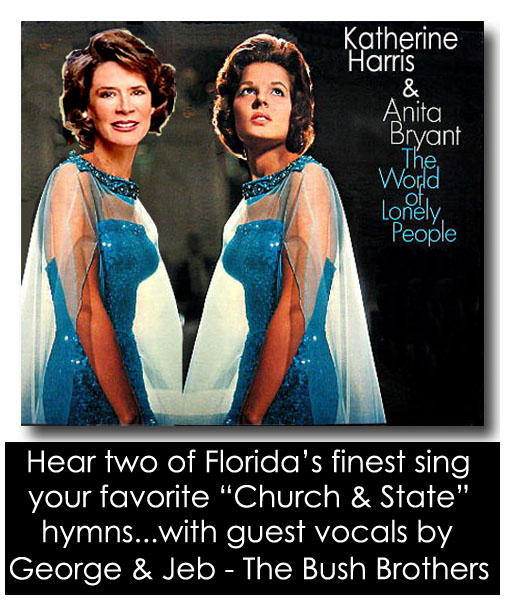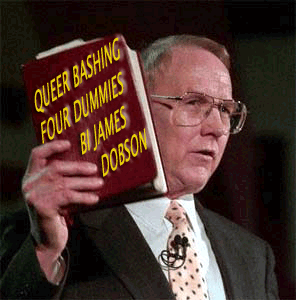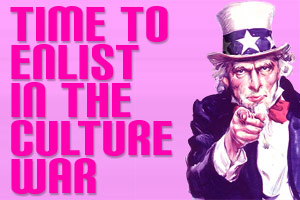Katherine & Anita: The World Of Lonely People genre: Gaylingual & Polispeak & Snapshot Thoughts & Tongue-In-Cheek

Daniel DiRito | August 26, 2006 | 12:09 PM |
link
| Comments (3)
![]()
![]()

Daniel DiRito | August 26, 2006 | 12:09 PM |
link
| Comments (3)
![]()
![]()
Daniel DiRito | August 25, 2006 | 11:11 AM |
link
| Comments (0)
![]()
![]()
Daniel DiRito | August 24, 2006 | 11:55 AM |
link
| Comments (0)
![]()
![]()
Daniel DiRito | August 18, 2006 | 6:35 PM |
link
| Comments (0)
![]()
![]()

James Dobson, the head of Colorado based Focus on the Family is leading a massive voter registration effort geared to engage millions of religious voters for the upcoming midterm election in November. Dobson has long been associated with Karl Rove and the Bush administration...as was most recently witnessed during the Bush's two Supreme Court appointments. Read the full article here.
The program, coordinated by the Colorado-based group Focus on the Family and its influential founder, James C. Dobson, would use a variety of methods — including information inserted in church publications and booths placed outside worship services — to recruit millions of new voters in 2006 and beyond.
The new voter registration program puts a special focus this year on eight states with key Senate, House and state-level races. Turning out core voters is central to the GOP strategy to retain control of Congress, especially as the party struggles with negative public sentiment over the war in Iraq and other administration policies.
According to the e-mail, county coordinators are being asked to work about five hours a week and would be responsible for "recruiting key evangelical churches."
The church coordinators, devoting one or two hours per week, would be in charge of "encouraging pastors to speak about Christian citizenship, conducting a voter-registration drive, distributing voter guides and get-out-the-vote efforts."
Critics say the practice is potentially illegal, citing tax laws that prohibit churches from engaging in partisan activities.
The IRS has launched a program to crack down on violators, with investigations pending against dozens of churches.
The willingness of the GOP and its supporters to conflate religion with politics has proven to be a successful tactic and one that has amplified the polarization and polarity seen in U.S. politics. Many have expressed doubt that the religious right would turnout in 2006 given disappointment with Bush on several issues that motivate such voters. Thought Theater has previously argued that the Rove strategy is to focus on winning the support of religious figures in leadership positions. Clearly, that effort has been successful and there is little reason to believe that it won't continue to be effective in mobilizing those voters that are affiliated with these leaders. Rove is a master at delivering targeted messages to motivate various constituency groups.
The Rev. Barry W. Lynn, executive director of Americans United for Separation of Church and State, called the evangelical voter registration drive a "blatant effort by Dobson to build a partisan political machine based in churches."
"He has made it abundantly clear that electing Republicans is an integral part of his agenda, and he doesn't mind risking the tax exemption of churches in the process," Lynn said. "Dobson wants to be a major political boss, and this is his way to get there."
The Republican Party is escalating its own courtship of evangelicals, registering voters at Christian rock concerts, state fairs and other events that draw religious activists and core conservatives.
Democrats need to be mindful that despite opposition to the war in Iraq, religious voters are not likely to support Democratic candidates...especially as the efforts of Dobson and his ilk work to equate the Party with social issues that religious voters will be unable to accept such as same-sex marriage, abortion rights, and stem cell research. Hard core evangelicals will hear Dobson's message that staying at home due to dissatisfaction with the Bush administration will only lead to further erosion on the issues they seek to impact. Dobson knows all too well the risks associated with Democratic control of the House or the Senate. I expect the dissemination of religious rhetoric to meet or exceed the levels seen in 2004.
Daniel DiRito | August 15, 2006 | 4:06 PM |
link
| Comments (0)
![]()
![]()

The Bush administration's ABC program...a plan to combat HIV that promotes abstinence until marriage, being faithful, and condoms if necessary is being met with mixed reviews at the XVI International AIDS Conference in Toronto. Thought Theater previously reported on the programs negative implications in Uganda and it appears that other African countries are expressing concerns about the program. The full Washington Post article can be found here.
More important, the evidence that ABC is changing behavior is quite spotty, with condom use appearing to be the most acceptable of the three forms of advice.
ABC is a centerpiece of the Bush administration's $15 billion, five-year plan to fight AIDS in 15 target countries, most of them in Africa.
The Bush program stipulates that one-third of the money spent on preventing sexual transmission of the virus must go for "abstinence until marriage" messages.
The interim evaluation of efforts in Botswana, supported by the U.S. Centers for Disease Control and Prevention, found that much of the ABC message was getting through, but that it was not making much of a difference.
While I'm not opposed to abstinence messages, I simply don't see such programs as an answer to HIV. Abstinence programs require 100% compliance to be successful...an unrealistic objective when it comes to sex. All too often such programs convey a moral judgment which makes the objective use of condoms more difficult. People often make poor decisions when they equate their behavior with a morally unacceptable activity. Instead of being thoughtful and deliberate, they often act impulsively...which is a dangerous way to confront HIV. Condom use has to be promoted without moral judgment in order to be effective...if using a condom is seen to be part of an immoral act; it is less likely to be employed. The reporting seems to support this argument.
The people who had been counseled were also twice as likely to have been tested for HIV in the previous year, and to have discussed that possibility with a sex partner. However, they were just as likely to have a partner outside marriage as the people who had not gotten a visit from a counselor, and they were no more likely to be using a condom in those liaisons.
"People who were exposed to the program had greater knowledge but were no more likely to be practicing ABCs," said Margarett K. Davis, director of the "BOTUSA" collaboration between the two countries.
A survey of 1,400 Kenyan teenagers found a fair amount of confusion about ABC's messages. About 15 percent of the girls and slightly less than half the boys had had intercourse.
Half of the teenagers could correctly define abstinence and explain why it was important. Only 23 percent could explain what being faithful meant and why it was important. Some thought it meant being honest, and some thought it meant having faith in the fidelity of one's partner. Only 13 percent could correctly explain the importance of a condom in preventing HIV infection. About half spontaneously offered negative opinions about condoms, saying they were unreliable, immoral and, in some cases, were designed to let HIV be transmitted.
Some studies in the U.S. suggest that the comprehensive ABC education has reduced the likelihood that sixth and seventh grade students would engage in sexual intercourse. The study data covers a two year period and the data suggested that only 48 percent of those given abstinence only messaging engaged in sexual intercourse compared with 61 percent of those given a comprehensive message that included condoms. Missing from the data I reviewed is how many of those who did engage in sexual intercourse practiced safer sex with the use of a condom. I contend that it is possible to use fear and moral judgments to reduce sexual activity (or the willingness to report having engaged in such activity)...but for how long and at what risk are the essential questions that are seemingly being ignored.
If the majority of the 48 percent abstinence only group that engaged in sexual intercourse did so without condoms while a majority of the 61 percent comprehensive message group (including condom education) that engaged in sexual intercourse did so with condoms, then clearly the latter group was better served and the likelihood of transmitting HIV or other sexually transmitted diseases...as well as the potential to become pregnant...were diminished in this group.
One of the prevailing problems with much of the current statistical data being generated is that it is conducted with bias by groups that are the beneficiaries of this type of government funding. Further, proving the outcome desired by the Bush administration assures that the programs continue regardless of the actual realities. Unless the research fully extracts all the facts, it is impossible to objectively evaluate the benefits or the shortcomings of these programs. In fact, to actually ascertain the benefits of an abstinence only program, one would need to track these children until they were married. At the same time, one single failure during the years until that happens may well prove deadly.
Ironically, the Bush administration understands and likes to say that the U.S. has to be right 100 percent of the time to prevent a terrorist success. They tout that fact to demonstrate the daunting task of protecting America and yet they are employing the same model...by choice...to protect America's youth. We may have to live with that reality when it comes to terrorism but with regards to the health and wellbeing of young Americans such a concession is unconscionable.
Daniel DiRito | August 15, 2006 | 9:43 AM |
link
| Comments (0)
![]()
![]()

A new Pew Research poll indicates that Americans may be more moderate than expected on five key cultural issues. The survey indicates that on most issues, a majority of voters prefer a middle ground approach. Reuters has the full article here.
Best illustrating the willingness of Americans to consider opposing points of view is that two-thirds of poll respondents supported finding a middle ground when it comes to abortion rights -- a solid majority that stood up among those calling themselves evangelicals, Catholics, Republicans or Democrats.
The issue of abortion continued to split the country -- 31 percent want it generally available, 20 percent say it should be allowed but want to impose some restrictions, 35 percent want to make it illegal with few exceptions, and 9 percent want it banned altogether.
On five prominent social issues -- abortion rights, stem cell research, gay marriage, adoption of children by gay couples, and availability of the "morning-after" pill -- most Americans did not take consistent stances.
Just 12 percent took the conservative position on all five issues, while 22 percent took the opposite stance on all five. The bulk of Americans had mixed opinions.
On the subject of gay unions, 56 percent opposed giving gays the right to marry, but 53 percent favored allowing gays to enter into legal agreements that provide many of the same rights as married couples.
There has been an increase in recent years in the proportion of Americans who believe homosexuality is innate -- 36 percent, up from 30 percent in 2003. Similarly, 49 percent believed homosexuals cannot be changed to heterosexual, compared to 42 percent in 2003.
The poll's findings on stem cell research -- which preceded President George W. Bush's veto of a bill to expand federal funding -- showed 56 percent favored the research even though human embryos would be destroyed, while 32 percent were opposed.
Unfortunately, the extreme views attract the most attention as news outlets seek to report on controversial issues by having two polarized individuals debate the subject. When this happens, both sides utilize the standard rhetoric that has traditionally dominated the headlines...furthering the appearance of the divide. A reasonable dialogue would certainly be a refreshing alternative however it wouldn't likely boost viewer ratings. That's unfortunate because the rhetoric helps promote the underlying prejudices and perpetuates the misinformation that fuels conflict.
Daniel DiRito | August 5, 2006 | 10:52 AM |
link
| Comments (0)
![]()
![]()
Read about the Director and Cast
Powered by:
Movable Type 4.2-en
© Copyright 2024
site by Eagle River Partners & Carlson Design
"Thanks Daniel - What a cool site...look forward to stopping in often."
Steve Clemons - The Washington Note
"I added a link to your site...You do great work...That was enlightening."
Steve Soto - The Left Coaster
"You have a good blog. Cheers"
Digby - Hullabaloo
"I have to pay you a huge compliment and say that in reading your posts and your blogroll you didn't fit into one category. I say it's a compliment because some of the best sites on the left, center, and right aren't always predictable when you begin reading their posts...because they're thinking through the issues."
Joe Gandelman - The Moderate Voice
"I really do appreciate your great comments and I think you have a great blog."
Michael J.W. Stickings - The Reaction